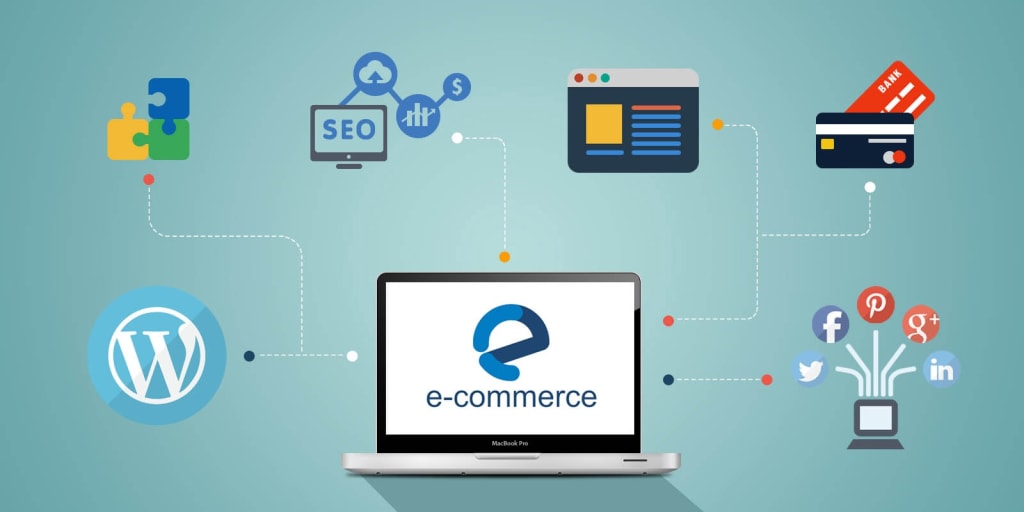A Guide to Develop Ecommerce Website
Developing an e-commerce website

Many dream of self-employment in e-commerce - with easy access to advanced tools and a market that continues to grow rapidly, this goal is becoming easier and easier to achieve.
E-commerce is now seen as a future-proof and crisis-resistant model. The growth of online business is now significantly faster than that of traditional shops, which is why even established business houses have introduced online sales as a supplementary measure. In addition, the hurdles are low. Much can be taught by yourself and large investments such as renting space are not absolutely necessary. With a little time and motivation, anyone can achieve this.
In the following, this guide highlights all the important topics and development opportunities that you should deal with before starting your own business.
Market research
Before starting any venture, it is advisable to carefully analyze the market for your own product. Is my product in demand? Is the market big enough for that? What are my target groups? Is my product easy to ship? These are, among other things, questions that you should consider before starting development. A trend analysis of search engines and the sifting and analysis of social media platforms and existing marketplaces can be helpful.
Development of the website
In principle, the development of an online shop differs only slightly from other websites. Since they are intended for the sale of physical or digital products, a few special features are usually required, such as a catalog of the products with categories, a search function, product reviews, a shopping cart and the integration of a payment service.
The first step is to choose the platform or type of development. There are various options here, which differ greatly in terms of their options and required experience and each have their own advantages and disadvantages. These can be divided into the following categories:
• Website builders
• Content management systems (CMS) such as B. Wordpress or Magento
• In-house development
Website builders
Website builders like Jimdo, Shopify, Wix and Co. are popular because of their simplicity. They do not require any programming knowledge, are inexpensive, quick to develop (time-to-market) and offer regular automatic security updates. With comparatively little training time, a website can be set up, content can be entered and products can be presented individually.
However, its use also has disadvantages. In order to successfully stand out from the crowd, you can hardly avoid an individualization of the website and a strong search engine optimization (SEO) and individual optical or technical adjustments can only be implemented to a certain extent with a construction kit. The design options are often limited to ready-made designs, logos, fonts, images and colors, and the range of extensions is also limited. In addition, it is usually not possible to intervene in the source code, which means that it is not possible to move to your own server - once you have set up the website, you are therefore bound to the provider.
WordPress / WooCommerce
WordPress is the most popular content management system (CMS) in the world and, in combination with the WooCommerce plugin developed by the same team, is very suitable for developing an e-commerce website. Although the CMS requires a little training, it is still easy to use. In addition, WooCommerce guides you through the process of setting up your online shop, so that at the beginning the main thing is to follow the steps in the plugin's setup wizard. In contrast to website builders, you retain full control of your website and benefit from a high degree of design freedom. A large number of available plugins make the CMS both powerful and versatile.
Magento
Magento is another popular e-commerce CMS that can be more powerful and offers more options for customizing and building functions within your shop. In return, however, more skills and knowledge are required, which makes familiarization more tedious. It is therefore more suitable for experienced developers or highly motivated entrepreneurs.
In-house development
Developing an ecommerce website from scratch gives you the greatest control and freedom of design. Entire e-commerce platforms that sell intermediaries or services rather than physical products (e.g. AirBnB, Uber, Eat.ch, etc.) are also possible. There are no limits to creativity and entrepreneurship.
However, developing such a website or platform in-house requires in-depth programming skills. A non-binding contact with an IT agency such as Entinity - a development company based in Bern, which covers all relevant areas from startup market analyzes to the development of apps and websites to hosting, search engine optimization and marketing - is recommended.
Marketing
As soon as your shop is online, you should deal with the topic of marketing in order to make your target group aware of your offer.
Content marketing
Content marketing is a valuable marketing strategy and has positive effects on search engine optimization (SEO) by creating content with added value and thus both generating traffic that can be attributed to you and building trust with your target group. This strategy requires a large investment of time and money, but it also has a large positive impact. One can differentiate between the following forms:
• Blog posts
• Detailed instructions or eBooks
• Videos (e.g. tutorials, instructional videos)
• Audio content (e.g. podcasts)
• Visual content (e.g. infographics)
Social media marketing
Social media like Instagram, Twitter, Facebook, and Pinterest can be a great way to increase brand awareness while driving traffic to your eCommerce website. Instagram and Pinterest are image-driven platforms. They are therefore well suited to present your products to a broad audience and to drive targeted traffic to your website. Twitter and Facebook, on the other hand, are well suited for expanding your community and promoting your products. You can also benefit from community building tools such as Facebook groups and Twitter chats. This means that you can always be in close contact with your target groups and collect feedback in order to continuously improve your products.
Influencer Marketing
Influencer marketing is used regularly to build successful ecommerce stores. This strategy is about cooperating with influencers on social media platforms such as Instagram in order to advertise your products to their audience. You benefit from greater awareness and trustworthiness. It is only important to find the right partner with the right target groups for your product.
Switch advertising
The easiest and fastest way to draw attention to your shop is to advertise it. At the beginning, this can make perfect sense, as your website will still have little relevance for search engines. Keep in mind, however, that this can be associated with ongoing and, depending on its efficiency, high costs. So you should start with other marketing strategies in parallel.
Get started
Setting up a self-employed business via an online shop requires some training and time, but can be achieved by anyone with ambition and patience. The most important step is always the decision to start, then nothing stands in the way of your success.
If you have any questions, contact an IT agency such as Entinity without obligation. We would be happy to advise you and support you in your venture.





Comments
There are no comments for this story
Be the first to respond and start the conversation.